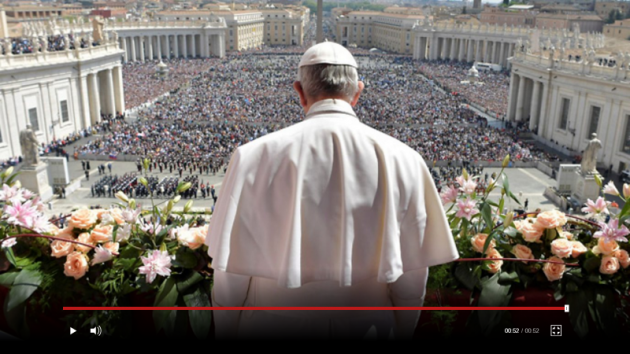Vatican's landmark approval of blessings for same-sex couples gets praised and questioned

The Vatican's landmark ruling backed by Pope Francis that Catholic priests can administer blessings to same-sex couples as long as they are not part of regular church rituals or liturgies is a bold move, that seems to draw support and also flak from within.
A Dec. 17, 2023 document from the Vatican's doctrinal office, which effectively reversed a declaration the same body had issued in 2021, said such blessings would not legitimise irregular situations but be a sign that God welcomes all, Reuters' news agency reported.
It should in no way be confused with the sacrament of heterosexual marriage, the ruling said.
"Doctrinal declaration opens possibility to bless couples in irregular situations," Vatican News headlined the announcement.
'IRREGULAR' RELATIONSHIP BLESSING
When two people request a blessing, even if their situation as a couple is "irregular," it will be possible for the ordained minister to consent. However, this gesture of pastoral closeness must avoid any elements that remotely resemble a marriage rite, reported Vatican News.
It said this is what is stated in the Declaration "Fiducia supplicans" on the pastoral meaning of blessings, published by the Dicastery for the Doctrine of the Faith and approved by Pope Francis.
Reuters explained that it said priests should decide on a case-by-case basis and "should not prevent or prohibit the Church's closeness to people in every situation in which they might seek God's help through a simple blessing".
Back in October, the Pope had hinted that an official change was pending in October in response to questions from five conservative cardinals at the start of a synod of bishops at the Vatican.
Since July 2023, the doctrine department has been led by Cardinal Victor Manuel Fernandez, an Argentinian prelate and ally of Francis, who has struck a different tone to his predecessors, CNN reported.
"When people ask for a blessing, an exhaustive moral analysis should not be placed as a precondition for conferring it," the declaration, authored by Cardinal Fernandez and another official, states. "The grace of God works in the lives of those who do not claim to be righteous but who acknowledge themselves humbly as sinners, like everyone else."
The new ruling says it is opening "the possibility of blessings for couples in irregular situations and for couples of the same sex" although says it is leaving decisions to "the prudent and fatherly discernment of ordained ministers."
'HUGE STEP FORWARD'
James Martin, a Jesuit priest who ministers to gay Catholics and who has been supported by Francis, described the ruling as a "huge step forward in the church's ministry to same-sex couples" and a dramatic shift from the Vatican's 2021 stance.
"The new declaration opens the door to non-liturgical blessings for same-sex couples, something that had been previously off limits for all bishops, priests and deacons," he told CNN. "Along with many Catholic priests, I will now be delighted to bless my friends in same-sex marriages."
America, the Jesuit Review, said reactions to the Vatican's declaration allowing priests to bless same-sex couples and other Catholics living in "irregular" situations range from tepid acknowledgment to enthusiastic embrace to outright condemnation.
It said some Catholics see the move as a step forward for L.G.B.T. people in the church while others are worried about the possibility of schism.
Greg Krajewski, a gay, married Catholic living in Chicago, said when he and his husband married, they did not approach a priest for a blessing because they did not want to put anyone in an awkward spot.
The Rev. Satish Joseph who ministers to L.G.B.T. Catholics in Dayton, Ohio told America he welcomed the news of the declaration because being able to offer a blessing to same-sex couples is a pastoral tool that he hopes makes the church feel more welcoming.
L.G.B.T. people, he said, often "run away from the church because they already feel that they are not going to be accepted and in some cases, even treated badly."
Being able to offer a blessing to same-sex couples, he said, "can make young people, or anybody who's discerning their orientation, feel that the church is not completely rejecting them."
NOT ENTHUSIASTIC
However, Archbishop Salvatore Cordileone, one of the U.S. hierarchy's most vocal supporters of the church's teaching on marriage, was less enthusiastic.
"I encourage those who have questions to read the Vatican declaration closely, and in continuity with the Church's unchanging teaching. Doing so will enable one to understand how it encourages pastoral solicitude while maintaining fidelity to the Lord Jesus Christ," he said in a statement.
The bishop of Crookston, Minn., Andrew H. Cozzens, emphasized that blessings often accompany calls to repentance from sin. He said in a statement,
"[W]hen people come to the Church seeking her blessing let us also proclaim to them the saving love of Jesus found through repentance for all of us who are sinners."
The Dec 17 ruling is bound to be opposed by conservatives, who already criticised the pope when he made his initial comments on the subject in October, according to Reuters.
Ulrich L. Lehner, a professor of theology at the University of Notre Dame in the United States, said the new guidance from the doctrinal office "invites misunderstanding and will sow confusion".
Voicing concern that some bishops would use it as a pretext to do what is explicitly forbidden, the professor added, "it is, and I hate to say it, an invitation to schism."